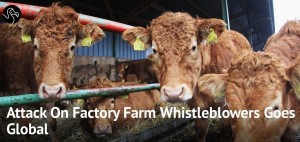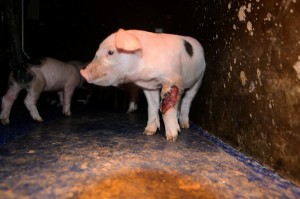 My new article for The Dodo:
My new article for The Dodo:
The man is dressed in all black with a ski mask covering his face. He’s shining a flashlight and his other hand is grasping a fence, as if he’s about to break through. The menacing imagery on the flier, along with bright yellow banners and an abundance of exclamation points, looks like it could be part of a Homeland Security campaign.
But this is part of a different type of campaign by the farmer’s association in Austria. The threat? Animal welfare activists who have published photographs and video of factory farms.
“Radical animal rights activists invade stables. Radical animal rights activists photograph frightened animals,†the flier warns. “Radical animal rights activists terrorize our families…We protect our children and our women!â€

For the past few years in the United States, the agriculture industry has tried to make it illegal to photograph or videotape animal abuse on factory farms and slaughterhouses. These “ag-gag”bills are a direct response to undercover investigations by groups like the Humane Society and Mercy for Animals. Their shocking video footage, obtained by workers with hidden cameras, has shown workers beating turkeys with metal pipes and slamming piglets onto concrete floors, among other abuses; the
investigations have also led to the largest meat recall in U.S. history, criminal charges, and ballot initiatives in multiple states calling for reform.
The proposals have become law in Iowa, Utah and Missouri, and more states will consider them this year. Now, other countries are following the lead of U.S. groups, and introducing their own attempts to silence factory farm whistleblowers.
The Austrian ad campaign, for instance, singles out animal activist Martin Balluch and his group VGT, the Association Against Animal Factories. Balluch has criticized the Austrian People’s Party for fighting animal welfare legislation, and he says it’s because 26 percent of the party has ties to the ag industry (much like in the United States, where the sponsors of “ag-gag” bills have close ties to the industry as well). To prove the point, VGT published photographs taken at farms owned by those politicians.
That didn’t sit well with the Austrian Farmers’ Association or the ÖVP, who hit back with the ad campaign and claims of “farm families terrorized.” Balluch says it’s “A number of pure fantasy and false statements to distract from the legitimate allegations” of abuse.
Austria is not alone.
These types of investigations are being classified as “terrorism†throughout Europe. EUROPOL publishes a report on terrorism threats, which is meant as a warning for law enforcement agencies. The report includes the 2005 bombing of the London subway, for example, and the 2004 bombing of the Madrid train system. The report also includes a section on animal rights activists, and a warning about activists with cameras.
“ARE [animal rights extremists] activists also use disinformation methods in order to discredit their targets and weaken their public acceptance,†the report says. “Images of sick and abused animals are embedded in video footage and made public.â€
In Finland, an animal rights group called Oikeutta eläimille (Justice for Animals) did exactly that, and faced harsh penalties. The group published photographs and video footage from 30 pig factory farms. The two-month investigation documented injured and dying pigs, and led to a national outcry by the public and members of parliament.
documented injured and dying pigs, and led to a national outcry by the public and members of parliament.
Instead of prosecuting those responsible for the animal abuse, law enforcement went after the whistleblowers. “When we decided to talk openly about the filming, we knew that we could be charged,†says Saila Kivelä. Among the charges she and Karry Hedberg faced was “aggravated defamation.†The pig industry called for prison sentences. But as Kivela told a Finnish media outlet: “How can you defame somebody by showing something that is true?â€
Earlier this year, an appellate court agreed and some of the charges against the group were dropped. One activist was given a suspended jail sentence of 20 days and ordered to pay the pig farmers’ legal fees. The more lasting impact, activists fear, is that the prosecution is meant to intimidate other investigators and whistleblowers.
In Australia, the agriculture industry has been closely following ag-gag, and wants its own copycat version. The Victoria Farmer’s Federation says existing laws haven’t been able to stop activists from covertly filming farms, and sometimes rescuing animals in need of medical treatment. Katrina Hodgkinson, the New South Wales Primary Industries Minister, said those filmmakers are “akin to terrorists.†The pig industry has paid for television ads that say animal activists with cameras “terrorise pigs at night.â€
Farmers are even offering a $10,000 (AUS)Â reward to anyone who can help convict an animal activist.
Since April, a Western Australian Senator named Chris Back has been formulating ag-gag legislation to stop websites like AussiePigs.com that publicize undercover footage. And with the Liberal-National Party Coalition winning by a landslide in September, animal advocates fear that the legislation could become a reality.
“We are concerned about the possibility of these laws being introduced into Australia but we are not, in any way, deterred from continuing what we know to be very important work,†says Patty Mark of Animal Liberation Victoria. Mark has been carrying out investigations of factory farms in Australia for 20 years.
“What we witness inside animal agriculture is beyond comprehension,†she told me. “The public would not believe us, if we were not able to bring out the video and photographs of the extreme torture, humiliation, deprivation, terror and pain the animals suffer endlessly in their incarceration… Ag-Gag laws won’t stop us.â€